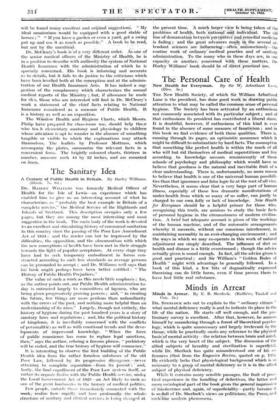The Sanitary Idea
A Century of Public Health in Britain. • By Harley Williams. (Black. 7s. 641.)
Dn. HARLEY WILLIAMS was fornierly Medical Officer of Health for the Isle of Lewis--an experience which has enabled him to give us an interesting account of what he characterizes as " probably the best example in Britain of a complete service," the Medical Service of the Highlands and Islands of Scotland. This description occupies only a few pages, but they arc among the most interesting and most suggestive in the book. The main body of the work is devoted to an excellent and stimulating History of communal sanitation in this country since the passing of the Poor Law Amendment Act of 1834 ; and the reader can but be impressed by the difficulties, the opposition, and the obscurantism with which the new conceptions of health have been met in their struggle towards the light of popular acceptance. At every stage they have had to seek temporary embodiment in forms con- structed according to such low standards as average persons can be persuaded to accept ; and Dr. Williams well says that his- bOnk, might perhaps have been • better entitled : The History of Public Health Prejudices."
The value of such a work as this needs-little emphasis ; for, as the author points out, our Public Health administration to- day is entrusted largely to committees. of laymen, who are being given progressively growing powers ; and, " in creating the future, few things are more perilous than unfamiliarity with the errors of the past, and nothing more helpful than an tincleratandiisg of its aims." Largely, though not entirely, the history of hygiene during the past hundred years is a story of sanitary laws and regulations ; and, like the political history of kingdom.% it is 'inevitably concerned- with the conflicts of personalitie3 as well as with emotional trends and the deve. lopments of impersonal knowledge. "- When the force of public conscience has come to replace legal sanctions, then," says the author, echoing a famous phrase, " prehistory will be ended, and the true history of hygiene will commence."
It is interesting to observe the first budding of the Public Health idea from the rather formless substance of the old Poor Law,_ followed by its progressive divergence never attaining _ to complete. separatioa:44r-ont..itS paione; `` and, lastly, the final engulfment of the POOT Law system itself, or rather- its'orgenie fusgas with the-Public Health service, sun-der the Local Government Act of 1920—an Act likely to rank as one of the great landmarks in the history of medical polities.
Few people, outside" those immediately connected with the wwk,:- realize bow- rapidly and how -profoundly-. the wholo; structure of sanitary and clinical services is l-eing changed at the present time. A mach larger view is -being taken of the problgms of health, both -national' individUAL The old line of demarcatiOn between preypitive'and,remedial medicine is fading ; and the great advances made in the several at- tendant sciences 'are -:-infq1„encinZ.often. unconsciously--,--the routine work of ordinary medical practice and of sanitary administration. To the many who in these days are, in one capacity or another,:- concerned with these Matters, Dr. Harley Williams' book should be of direct practical use


























































 Previous page
Previous page